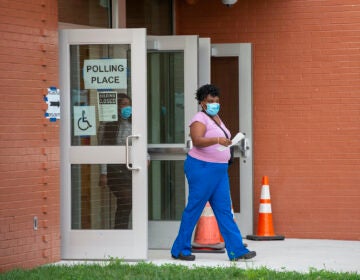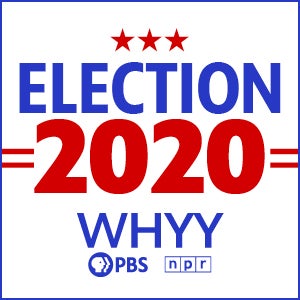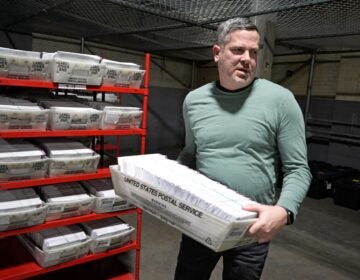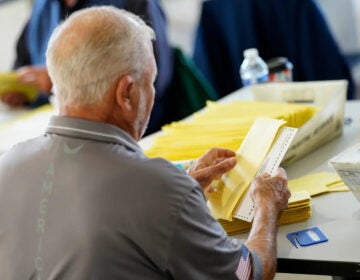Delaware judge refuses to order state to count late ballots
Officials began sending mail-in ballots to those who requested them this week and will continue to do so as late as four days before the election.

Vote-by-mail ballots are shown in sorting trays, Wednesday, Aug. 5, 2020, at the King County Elections headquarters in Renton, Wash., south of Seattle. (AP Photo/Ted S. Warren)
A Delaware judge on Friday rejected a request by the League of Women Voters to override state election law and allow absentee and mail-in ballots received after the state-mandated deadline in November’s election to be counted.
Delaware law has long required that absentee ballots be received by the time polls close at 8 p.m. on Election Day. The same deadline applies to ballots cast under a universal vote-by-mail law enacted by the General Assembly specifically for this year’s elections because of the coronavirus.
The League of Women Voters, represented by the American Civil Liberties Union and a Wilmington attorney, did not argue that the deadline as applied in past elections was facially unconstitutional. They claimed instead that the new law is unconstitutional as applied to the November election because, even though it makes voting much easier, voting by mail is a burden for some people.
They cited the significant number of vote-by-mail ballots expected and potential delays in Postal Service delivery in asking Vice Chancellor Sam Glasscock III to force officials to count ballots received up to 10 days after Election Day.
Glasscock noted that laws passed by the General Assembly enjoy a presumption of constitutionality, and that he cannot invalidate them, let alone rewrite them as the ACLU requested, unless their unconstitutionality is clear.
“At the time the Vote-by-Mail statute was enacted, the absentee ballot deadline, which the plaintiffs agree was constitutional with respect to the law as it then existed, already required Election-Day ballot receipt,” the judge wrote.
“I find nothing about the liberalization of the ability to mail ballots in the Act that created a constitutional violation. Those choosing to mail ballots have always had to vote sufficiently early to ensure delivery by Election Day.”
“The Plaintiffs have not shown — cannot show — that, on the record as it stands, it is clear, or even likely, that malfeasance or ineptitude on the part of those controlling the USPS will burden voters needing to vote by mail in a way that renders the deadline unconstitutional as applied,” the judge added.
Karen Lantz, legal and policy director of the ACLU of Delaware, said the group was disappointed by the ruling and would discuss next steps with the League.
Last week, in a separate case, Glasscock rejected a Republican Party challenge to the vote-by-mail law, similarly noting that legislation enjoys a presumption of constitutionality. The GOP had argued that lawmakers in the Democrat-controlled legislature exceeded their constitutional authority in invoking emergency powers to declare that conforming to the requirements of Delaware’s constitution, which has explicit limitations on absentee voting, “would be impracticable.”
State officials have said the rejection rate for mail ballots received late fell from about 3% in the July presidential primary to about 1% in last month’s statewide primary. Max Walton, an attorney that argued the case against the League for the state, said the 1% figure is similar to what other states have seen.
Officials began sending mail-in ballots to those who requested them this week and will continue to do so as late as four days before the election.
An attorney for the League argued voting by mail is a “burden” for some people, even though they never have to leave their homes or pay for a postage stamp or envelope.
The new law requires that vote-by-mail ballot applications be sent to all Delaware voters, who can also request applications online. Anyone choosing to vote by mail fills out and returns the application in a postage-paid envelope provided by the state. They then receive an actual ballot to fill out, with the return envelope and postage again provided by the state.
WHYY is your source for fact-based, in-depth journalism and information. As a nonprofit organization, we rely on financial support from readers like you. Please give today.








